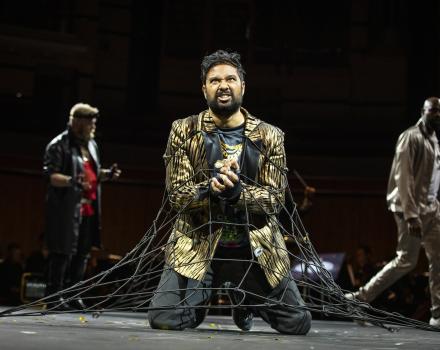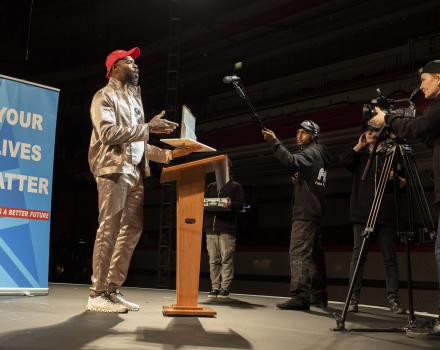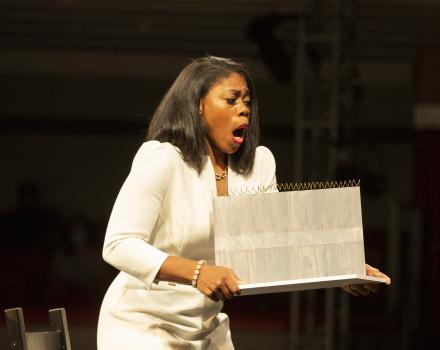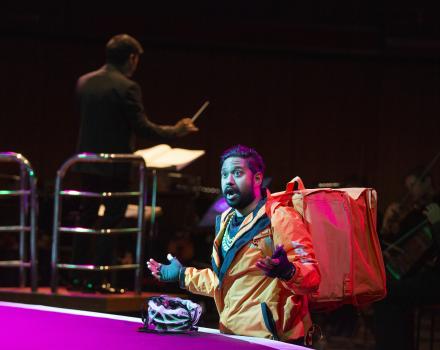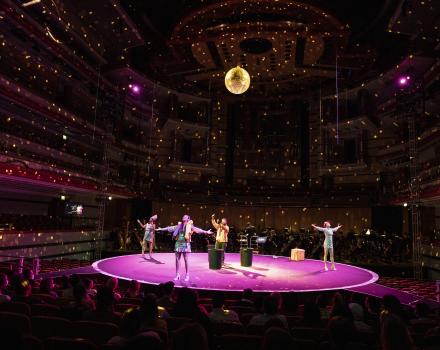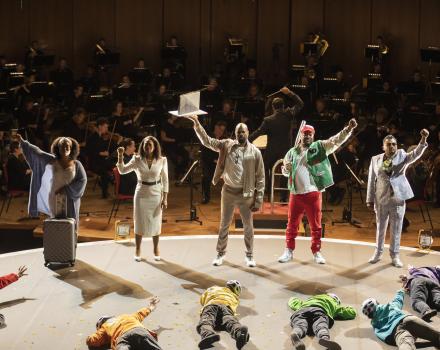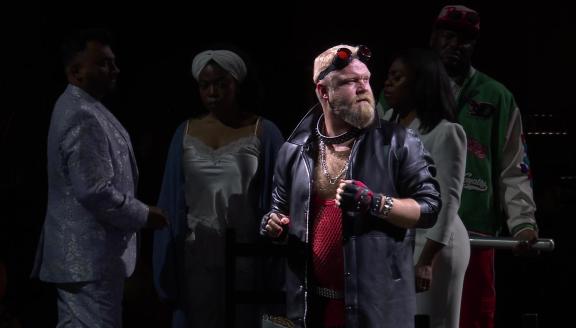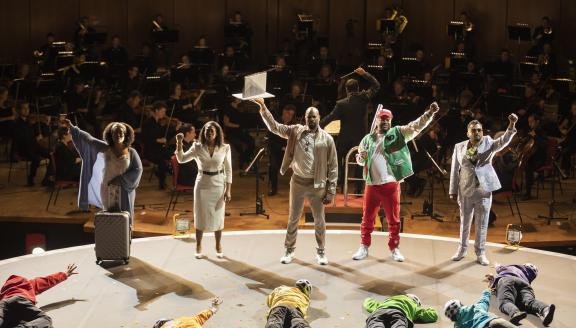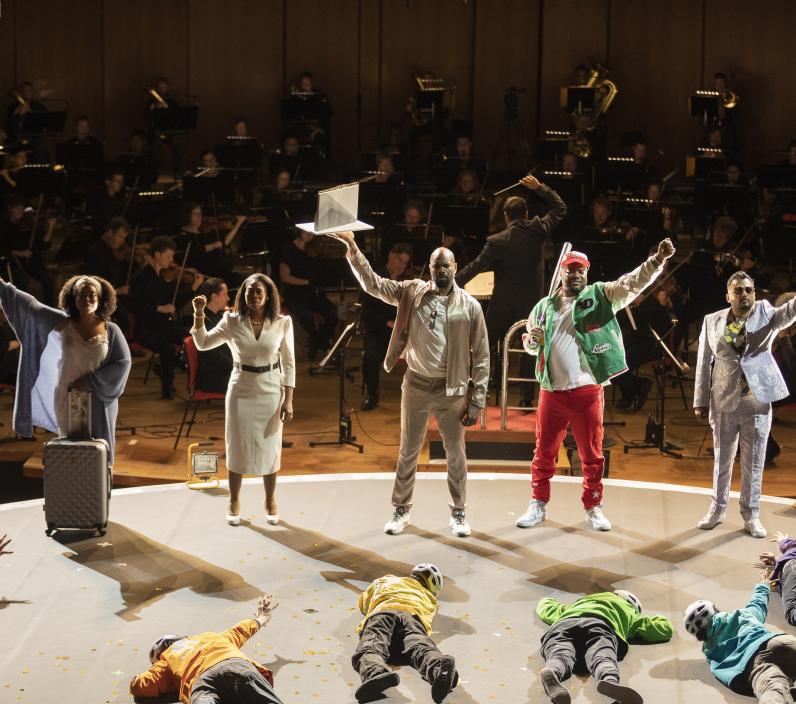
RhineGold

Hidden in plain sight, three guardians collude to protect the gold for those in power. An outsider, Alberich stumbles upon them and an opportunity to make his life matter, but at a cost. Meanwhile, Leader Wotan desperate to hang on to the Gods’ fading glory, struggles to balance power, his own laws and the standards of public life. But his Chief Advisor, Loge, always has a plan. Mother Nature warns that greed for power will bring its own destruction. No-one listens. Whose lives matter? Who pays the price?
Birmingham Opera Company, known for staging opera in empty warehouses and disused factories, here performs RhineGold in the relatively conventional surroundings of Birmingham Symphony Hall. The production is from August 2021 with the pandemic still dictating so much of our lives. This did not stop the company gathering an orchestra of 87 players from the City of Birmingham Symphony Orchestra and a stellar international cast performing alongside local volunteers. Conspicuous in his absence is the company’s founding director, Graham Vick, who passed away just as rehearsals were beginning. True to Vick’s spirit, his long-term collaborator Richard Willacy brings an operatic masterpiece close to the community that the company serves, with no fear of social commentary. This is an urban RhineGold; Rhinemaidens are selfie-taking party girls, Alberich is cycle courier, and Wotan is first seen giving a press conference for FNN: Fake News Network. This RhineGold, complete with the new English translation by Jeremy Sams, can be seen as a step closer to Wagner’s vision of a total work of art acting as a lever of change in society.
Cast
|
- The Gods
|
-
|
|---|---|
|
Wotan
|
Eric Greene
|
|
Loge
|
Brenden Gunnell
|
|
Fricka
|
Chrystal E Williams
|
|
Freia
|
Francesca Chiejina
|
|
Froh
|
Amar Muchhala
|
|
Donner
|
Byron Jackson
|
|
Erda
|
Gweneth-Ann Rand
|
|
- The Nibelungs
|
-
|
|
Alberich
|
Ross Ramgobin
|
|
Mime
|
John-Colyn Gyeantey
|
|
- The Giants
|
-
|
|
Fasolt
|
Keel Watson
|
|
Fafner
|
Andrew Slater
|
|
- The Rhine Girls
|
-
|
|
Woglinde
|
Zoe Drummond
|
|
Wellgunde
|
Felicity Buckland
|
|
Flosshilde
|
Georgia Mae Bishop
|
|
-
|
-
|
|
Orchestra
|
City of Birmingham Symphony Orchestra
|
| ... | |
|
Music
|
Richard Wagner
|
|---|---|
|
Text
|
Richard Wagner
|
|
Conductor
|
Alpesh Chauhan
|
|
Director
|
Richard Willacy
|
|
Translation
|
Jeremy Sams
|
|
Sets
|
Stuart Nunn
|
|
Lighting
|
Matthew Richardson
|
| ... | |
Video
STORY
ONE
There is gold in the river Rhine, gold that can be made into a ring. Whoever wears the ring gains the power to rule the world, so long as they give up love.
Three girls guard the gold. Alberich, a dwarf from another race, arrives. He declares his love for the three girls in turn. They humiliate him. The gold shines brightly and the girls tell Alberich the backstory to the gold. Frustrated at being rejected by the girls, Alberich curses love and steals the gold.
TWO
Wotan is ruler of the gods. Fricka is his wife. Fricka has three siblings: sister Freia, goddess of love, and brothers Donner and Froh. Loge is Wotan’s chief advisor. Fasolt and Fafner are giants, specialists in building.
Fricka wakes Wotan up. He’s thrilled he has a new castle to call home but Fricka’s worried – Wotan promised Fasolt and Fafner he’d give them Freia in exchange for the new castle. He’s confident that Loge, with his tricks, will find a loophole and a way out of the deal.
Fasolt and Fafner arrive with Freia. They want to stick to the original deal: they take Freia as payment for the castle. Wotan tries to buy time until Loge arrives.
Loge arrives, saying there is no alternative payment, since there’s nothing more valuable than love. Loge only knows of one example of someone giving up love… Alberich and the gold stolen from the Rhine. Fafner says Wotan and Loge have until the end of the day to come up with the gold as payment. Failing that, they’ll keep Freia. They go off with her as their hostage.
The gods only stay eternally young thanks to Freia’s golden apples. Without Freia, the gods grow weak and start to age. Wotan is determined to find Alberich and get the gold for himself.
THREE
Alberich has made all the other dwarves his slaves. His brother, Mime, has made a magic helmet called the Tarnhelm. With the Tarnhelm, Alberich can make himself invisible or transform himself into other creatures.
Wotan and Loge arrive underground. They witness Alberich’s slaves piling up a huge hoard of gold. Alberich boasts about his plan to rule the world using the power of the ring. Loge starts to fuel Alberich’s doubts about whether he can keep the gold safe. Alberich demonstrates the Tarnhelm, turning himself into a giant snake. Loge acts impressed and asks whether the Tarnhelm can make Alberich smaller. When Alberich turns himself into a toad, Wotan and Loge capture him and drag him back up to their world.
FOUR
Wotan and Loge, now back in their own world, bribe Alberich: they’ll set him free in exchange for all his wealth. Alberich orders his dwarves to bring the gold. He wants to keep the Tarnhelm and the ring. Wotan and Loge refuse. When Wotan snatches the ring, Alberich places a curse on it.
Fasolt and Fafner come back with their hostage, Freia. Fasolt still doesn’t want to hand her over. They’ll take the gold but only if it’s piled up high enough to hide her completely, with no gaps. When Fafner sees a little crack, he insists that Wotan add the ring to the pile. Loge objects, saying the ring belongs to the Rhine girls. Wotan wants to keep it. The giants make to leave again with Freia. Erda, mother nature, appears and warns Wotan to give up the ring. Wotan is unsettled. He calls the giants back and hands over the ring. They let Freia go. Fasolt and Fafner immediately start arguing over the ring. Fafner murders Fasolt.
Donner whips up a thunderstorm to clear the air. Froh makes a bridge out of a rainbow, leading to the castle gates. Wotan leads the gods over the bridge to the castle. Loge doesn’t go with them. He predicts that the gods are doomed. The Rhine girls are still crying over their lost gold.
INSIGHTS
Director Richard Willacy on the making of RhineGold
In the isolating year leading up to RhineGold, Graham Vick and I spoke many times about ‘castles in the sky’ – the illusions composed by leaders in whom we are expected to place our trust. Yet, he chose Wagner’s RhineGold for many reasons, not just as a Zeitgeisty political story. As always, for Graham, it was personal; it provided an opportunity for the artists who he has mentored to shine, a clear gesture of the company’s growth over 30 years and a significant work for Alpesh Chauhan’s first production as Music Director. But as often happens, life and death trump intention. In the end the journey for all towards RhineGold was intensely personal. Sadly, Graham fell ill just before we started rehearsals in mid-June, attending only a couple of sessions on Zoom in the first days as we sang through some sections in a rehearsal room. This was to be our last contact.
In Birmingham, we choose an opera, find a venue, assemble the company from scratch and work together to create a production. Taking it day by day, we begin the process of exploring the material, working on the content, testing it, talking it through with volunteers from all walks of life and artists from all over the world. Everything is developed in real time. No sets or costumes built in advance. We work in and of the now. Our usual type of space is a disused factory, abandoned nightclub, ice rink, aircraft hangar. In June 2021 we still had options for a Big Top version but, with COVID still very much present and without Graham, by mid-July, I had decided to bring the work to Birmingham’s amazing Symphony Hall which itself is set in the same building as the International Conference Centre; somehow a suitable home to Leader Wotan to launch his ‘Your Lives Matter’ campaign.
And then the worst happened. Graham passed away on 17 July 2021. The company’s response was overwhelming. We sat down together, talked about our feelings and decided together to go for it. Over a few devastating, fractured weeks, the company – many of whom have their own personal relationship with Graham – discovered what really binds us: we shared our experience, humanity and purpose.
And here you have the result. It is not a Graham Vick production. I’m pretty sure he would have gone a different way on many characters and, as is usual in Birmingham, the design was conjured on the hoof. But it is testament to Graham’s conviction to trust the material, to create a space in which universal truths can manifest in images from the now, to base all choices on repertoire, singers, images and language to represent and speak to a diverse 21st century audience. If we allow these great works to breathe in the air of the present, they will speak of who we really are, now; they live in us, the flawed humankind they portray. And what a portrayal; Wagner’s genius RhineGold 150 years on from its first manifestation, delivers such hardwired rollercoasting dramatic, stirring, emotional depth, joyful irony and humour.
With a great story, great performers and production team, an open door to explore the work with the public as part of the process, a barnstorming orchestra, 3 bins, 28 washing up bowls, a table, two chairs, a lectern and a pop-up in a BOC’d space, the DNA of the company shines through. Even in a concert hall, it is still perhaps – as our tag line states – ‘Not what you expect from Opera’.
Gallery
